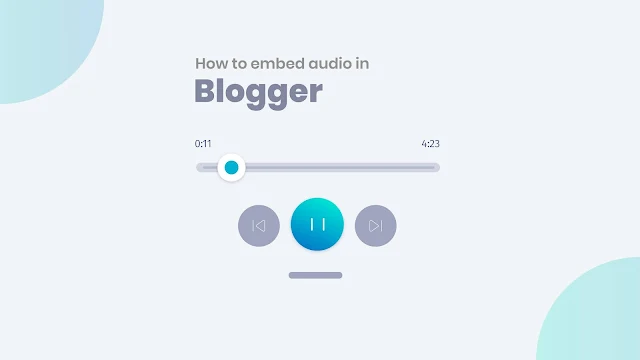
In the ever-evolving world of blogging, captivating your audience with engaging content is paramount. While written words form the foundation of any blog post, incorporating multimedia elements like audio files can elevate your content to new heights. This comprehensive guide will equip you with the knowledge and techniques to seamlessly embed audio files into your Blogger site, transforming your blog into a captivating multimedia experience.
Method 1: Embedding Audio Using the Audio Attribute
The <audio> tag is a versatile HTML element that provides a straightforward approach to embedding audio files into your Blogger site. This method offers the advantage of providing native audio player controls and default download buttons, enhancing the user experience.
Step 1: Upload Your Audio File to Google Drive
Google Drive serves as a convenient cloud storage platform for hosting your audio files. To begin, upload the desired audio file to your Google Drive account.
Step 2: Retrieve the Shareable Link
Right-click on the uploaded audio file and select "Get link." In the pop-up window, ensure that the sharing setting is set to "Anyone with the link can view." Copy the provided link.
Step 3: Generate a Direct Link
Utilize a GDirect Link Generator tool to convert the shareable link into a direct link. This direct link will enable the audio file to play directly within your Blogger post.
Step 4: Integrate the Code into Your Blogger Post
Access your Blogger post and switch to the HTML view.
Paste the following code snippet:
HTML
<audio controls>
<source src="Paste Google Drive Direct Link Here" type="audio/mp3"></source>
</audio>
Replace "Paste Google Drive Direct Link Here" with the actual direct link you generated in Step 3.
Step 5: Preview and Publish
Switch back to the Compose view to preview your embedded audio file. Upon confirmation, publish your Blogger post.
Method 2: Utilizing an HTML Audio Iframe
The HTML <iframe> element provides an alternative method for embedding audio files. This method involves embedding an external audio player within your Blogger post, offering greater customization options.
Step 1: Host Your Audio File
Choose an external audio hosting service to store your audio file. Several free and paid options are available.
Step 2: Generate an Audio Player Iframe Code
Navigate to your audio hosting service and retrieve the embed code for the audio player. This code typically consists of an <iframe> tag with the audio file URL embedded within its src attribute.
Step 3: Integrate the Code into Your Blogger Post
Access your Blogger post and switch to the HTML view.
Paste the generated iframe code into the desired location within your post.
Switch back to the Compose view and preview your embedded audio player.
Publish your Blogger post.
Conclusion:
By mastering these techniques, you can effortlessly embed audio files into your Blogger site, transforming your blog into a multimedia powerhouse. Whether you choose the <audio> attribute method or the HTML audio iframe approach, the ability to incorporate captivating audio elements will undoubtedly enhance the engagement and impact of your blog posts. So, embrace the power of audio and let your Blogger site come alive with the rhythm of sound!
Step 5: Preview and Publish
Switch back to the Compose view to preview your embedded audio file. Upon confirmation, publish your Blogger post.
Method 2: Utilizing an HTML Audio Iframe
The HTML <iframe> element provides an alternative method for embedding audio files. This method involves embedding an external audio player within your Blogger post, offering greater customization options.
Step 1: Host Your Audio File
Choose an external audio hosting service to store your audio file. Several free and paid options are available.
Step 2: Generate an Audio Player Iframe Code
Navigate to your audio hosting service and retrieve the embed code for the audio player. This code typically consists of an <iframe> tag with the audio file URL embedded within its src attribute.
Step 3: Integrate the Code into Your Blogger Post
Access your Blogger post and switch to the HTML view.
Paste the generated iframe code into the desired location within your post.
Switch back to the Compose view and preview your embedded audio player.
Publish your Blogger post.
Conclusion:
By mastering these techniques, you can effortlessly embed audio files into your Blogger site, transforming your blog into a multimedia powerhouse. Whether you choose the <audio> attribute method or the HTML audio iframe approach, the ability to incorporate captivating audio elements will undoubtedly enhance the engagement and impact of your blog posts. So, embrace the power of audio and let your Blogger site come alive with the rhythm of sound!
